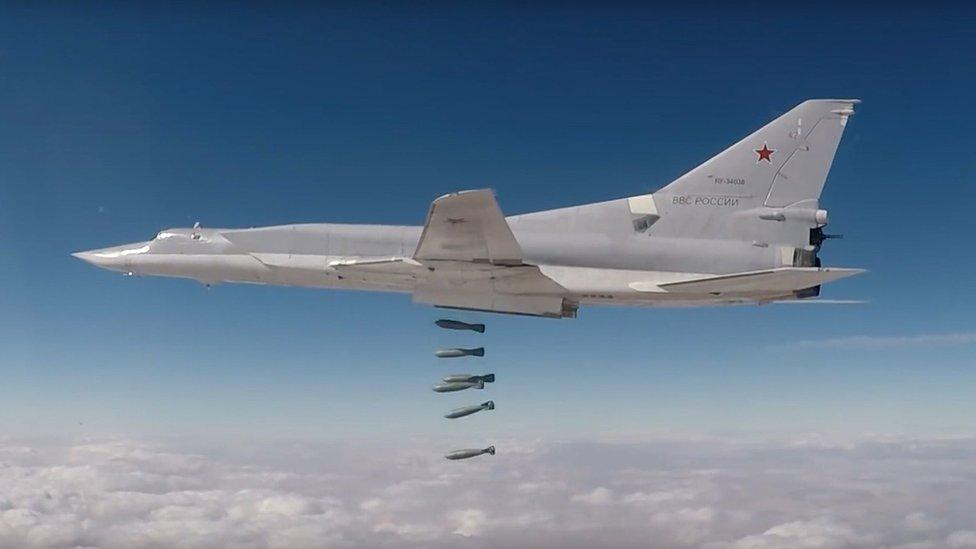Syria war: Russia denies bombing civilians in Deir al-Zour village
- Published

Russia said it bombed IS targets in Deir al-Zour province on Sunday, but not al-Shafah
Russia has denied its warplanes carried out air strikes on a village in eastern Syria on Sunday, which activists say killed dozens of civilians.
The Syrian Observatory for Human Rights said 53 people died in al-Shafah, while website DeirEzzor24 put the toll at 25.
Both said Russian aircraft, which are supporting Syrian pro-government forces battling so-called Islamic State (IS) in the area, were behind the attack.
But on Monday Russia's defence ministry insisted it did not bomb al-Shafah.
"The Russian Aerospace Forces' strikes in Syria target areas outside population centres, and only facilities of the international terrorist groups," a statement said, according to Russian news agencies.
"The reports by the Syrian Observatory for Human Rights, which is based in Great Britain, about the alleged strikes by the Russian Aerospace Forces' planes on the village of al-Shafah are yet another fake," it added.
An earlier statement had announced that six Russian Tu-22M3 long-range bombers struck IS command posts and militant positions in Deir al-Zour province on Sunday.
DeirEzzor24, an activist-run news website, reported that Sunday's strikes had targeted a residential compound, external where several displaced families were staying.
Most of the 25 people killed were women and children, it said, adding that the death toll might rise because many victims were still trapped under collapsed buildings.
The Syrian Observatory, which relies on a network of sources inside Syria, also said residential buildings were hit and that 21 children were among the dead.
Al-Shafah is located on the eastern bank of the River Euphrates, about 110km (68 miles) south of the city of Deir al-Zour and 14km from the border with Iraq.
It is just to the north of the town of Albu Kamal, which Syrian soldiers and pro-government militiamen captured earlier this month with Russian air support.
The BBC witnesses the last stand of IS in Syria
In a separate development on Monday, the Syrian Observatory said another 18 people had been killed by government air strikes and shellfire in rebel-held Eastern Ghouta outside Damascus.
More than 100 people are now believed to have been killed in the past two weeks as a result of the Syrian military's bombardment of the besieged area, despite it being one of four "de-escalation zones" set up earlier this year by the government's allies, Russia and Iran, together with rebel backer Turkey.
UN humanitarian adviser Jan Egeland said earlier this month that an estimated 400,000 civilians living in Eastern Ghouta faced "complete catastrophe" because aid deliveries were being blocked by the government and that hundreds of people needed urgent medical evacuation.
Meanwhile, UN special envoy Staffan de Mistura said the Syrian government had not yet confirmed it would attend peace talks in Geneva due to start on Tuesday.
Dozens of people have been killed by air strikes and shelling in the rebel-held Eastern Ghouta
The Syrian newspaper al-Watan reported that the government delegation had postponed its departure because the opposition had reiterated its demand that President Bashar al-Assad should stand down.
The newly appointed head of the opposition's negotiating committee, Yahya al-Aridi, said on Sunday: "The Assad regime must not be allowed to play for time while people are besieged and bombed."
Mr Assad, whose forces have inflicted a series of defeats on rebel forces over the past two years, told Russian President Vladimir Putin last week that he was "ready for dialogue with all those who want to come up with a political settlement".
Mr de Mistura said he expected the government to participate in light of Mr Assad's comment, and stressed that he would "not accept any preconditions by any party".
- Published26 November 2017
- Published13 November 2017
- Published13 November 2017
- Published12 November 2017
- Published4 November 2017
- Published3 November 2017
- Published2 May 2023